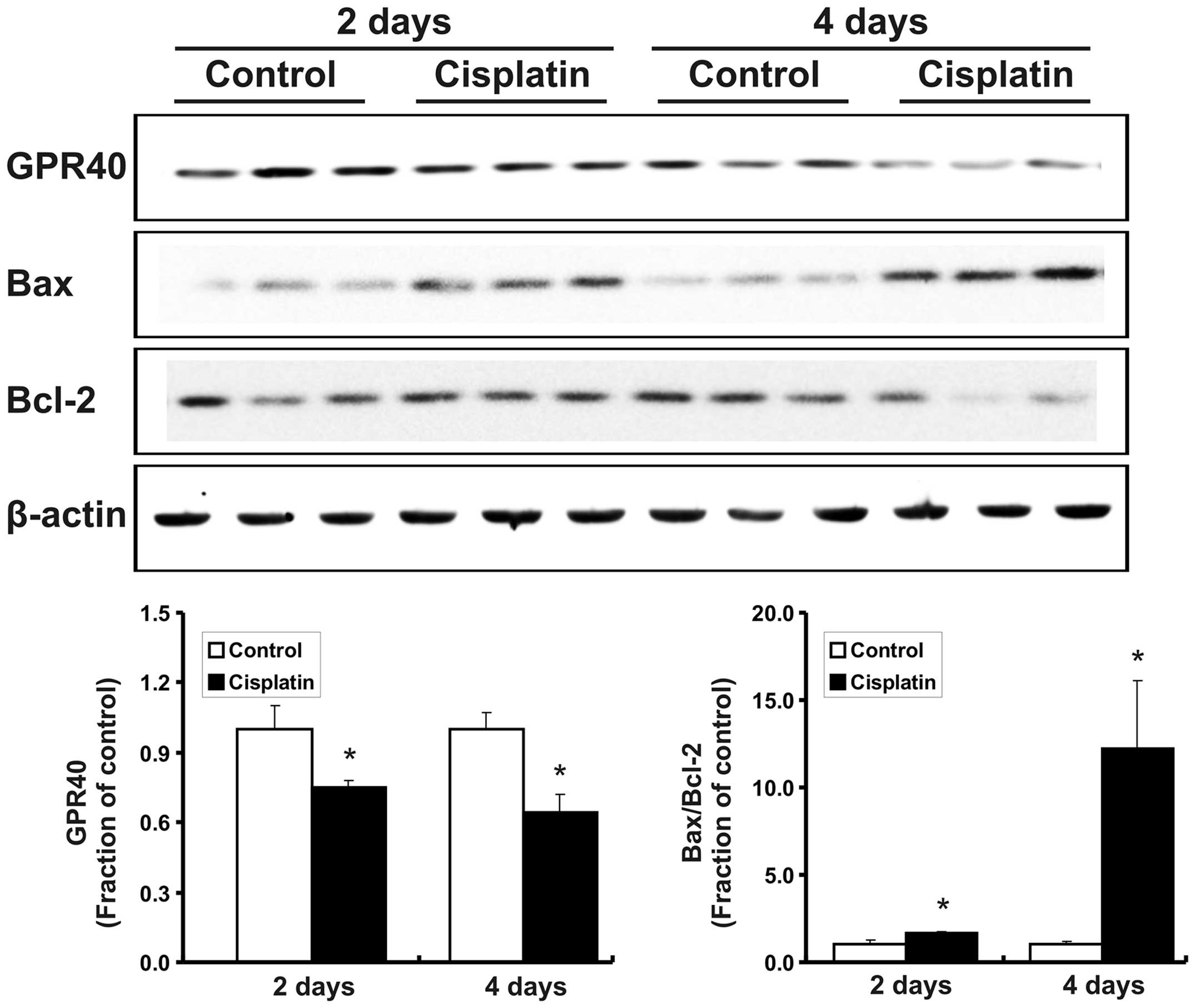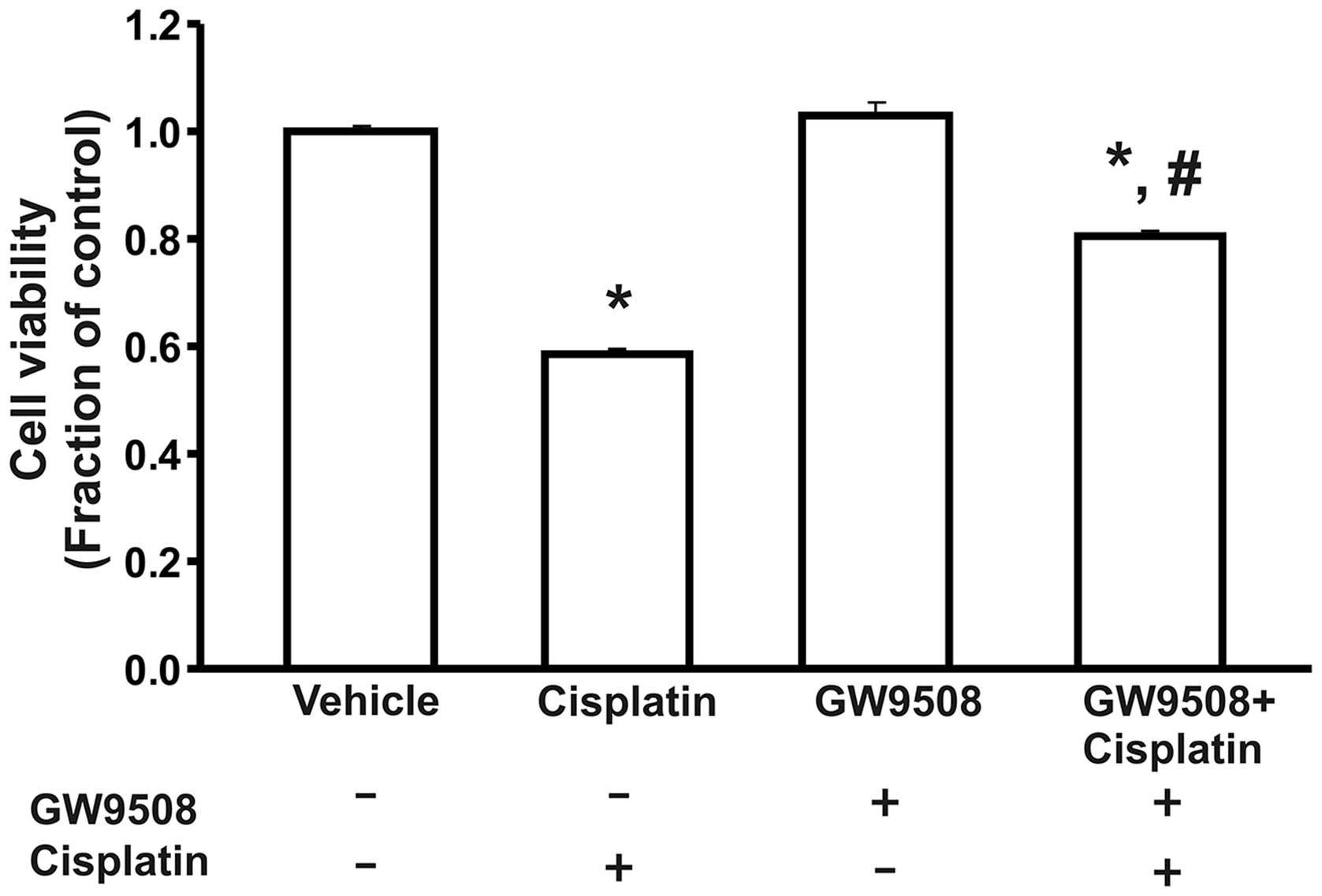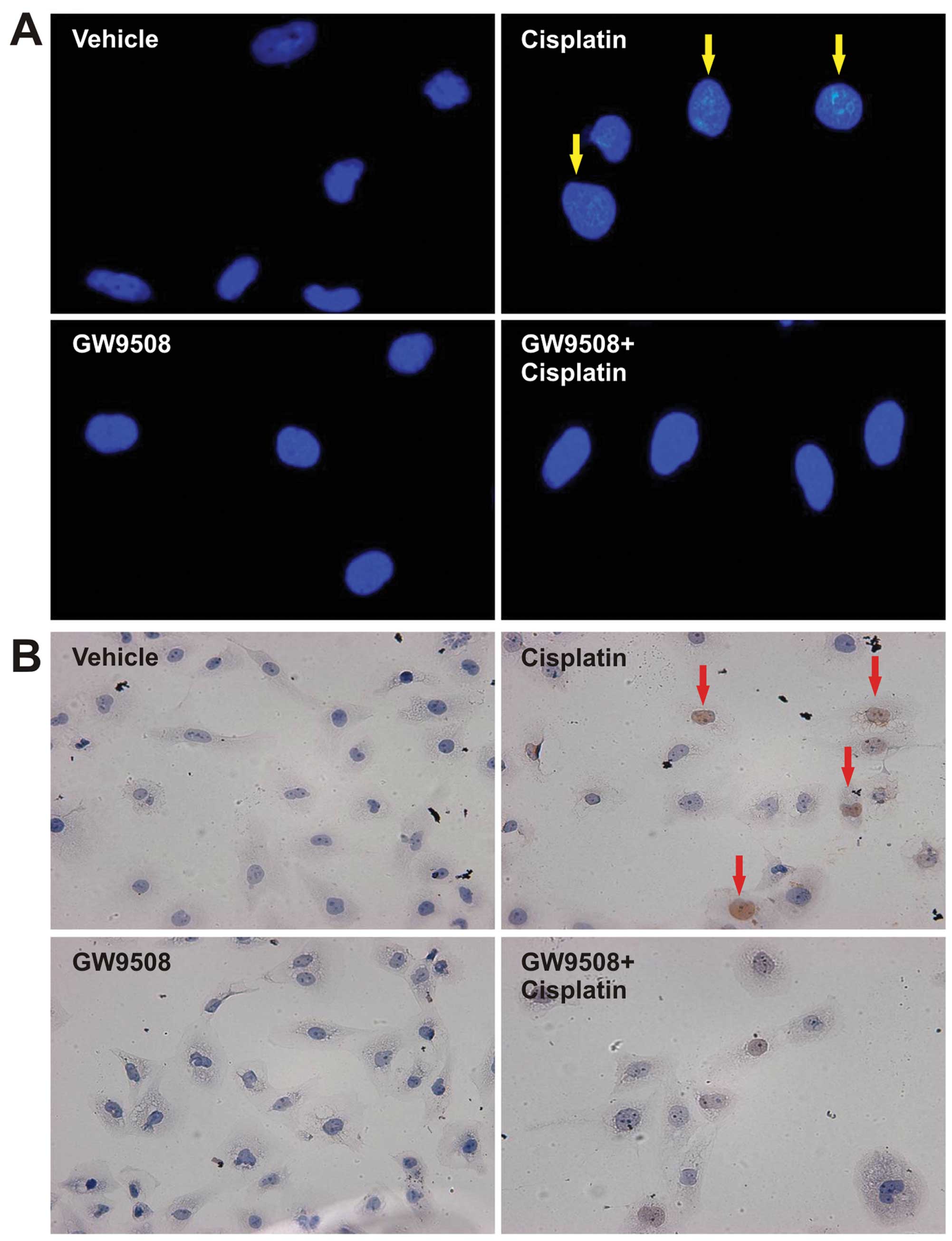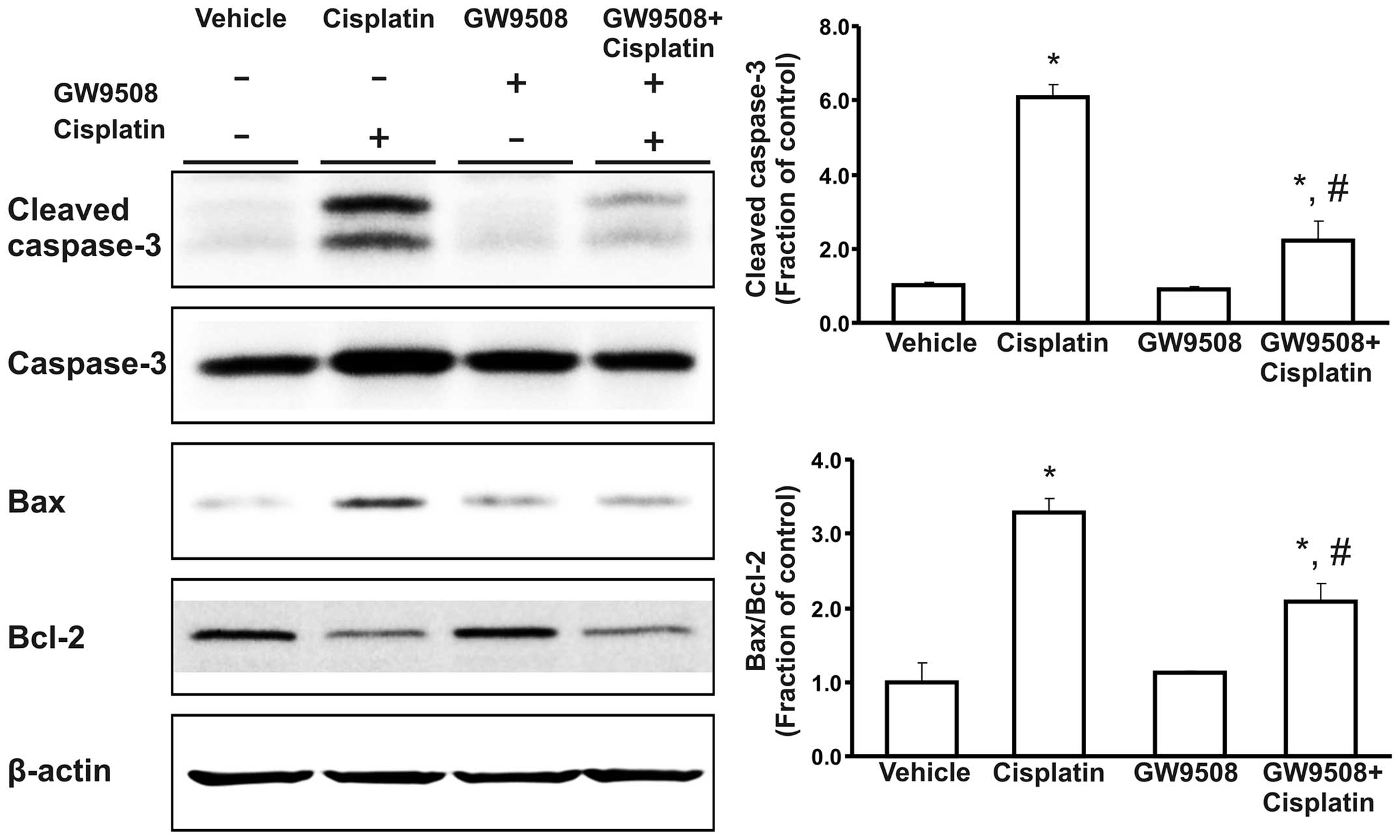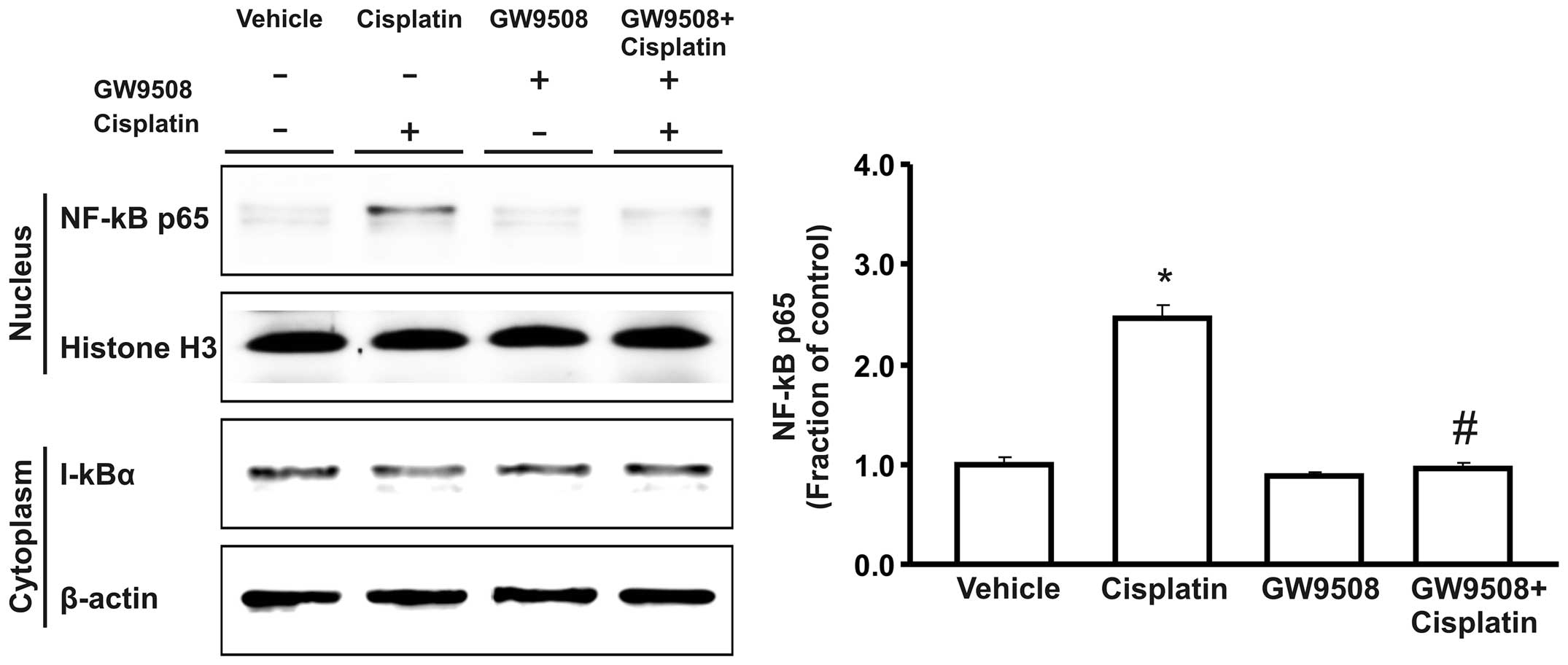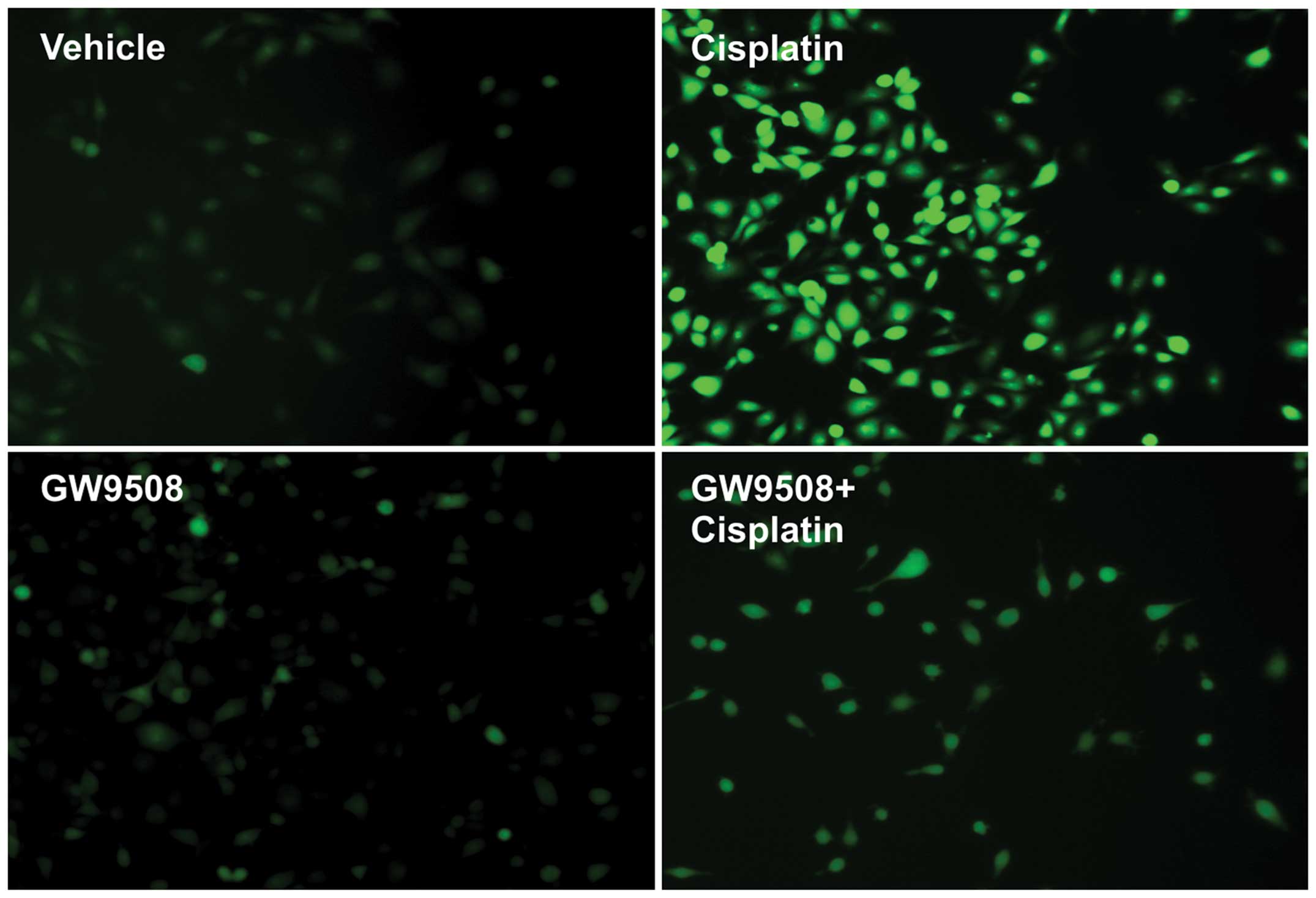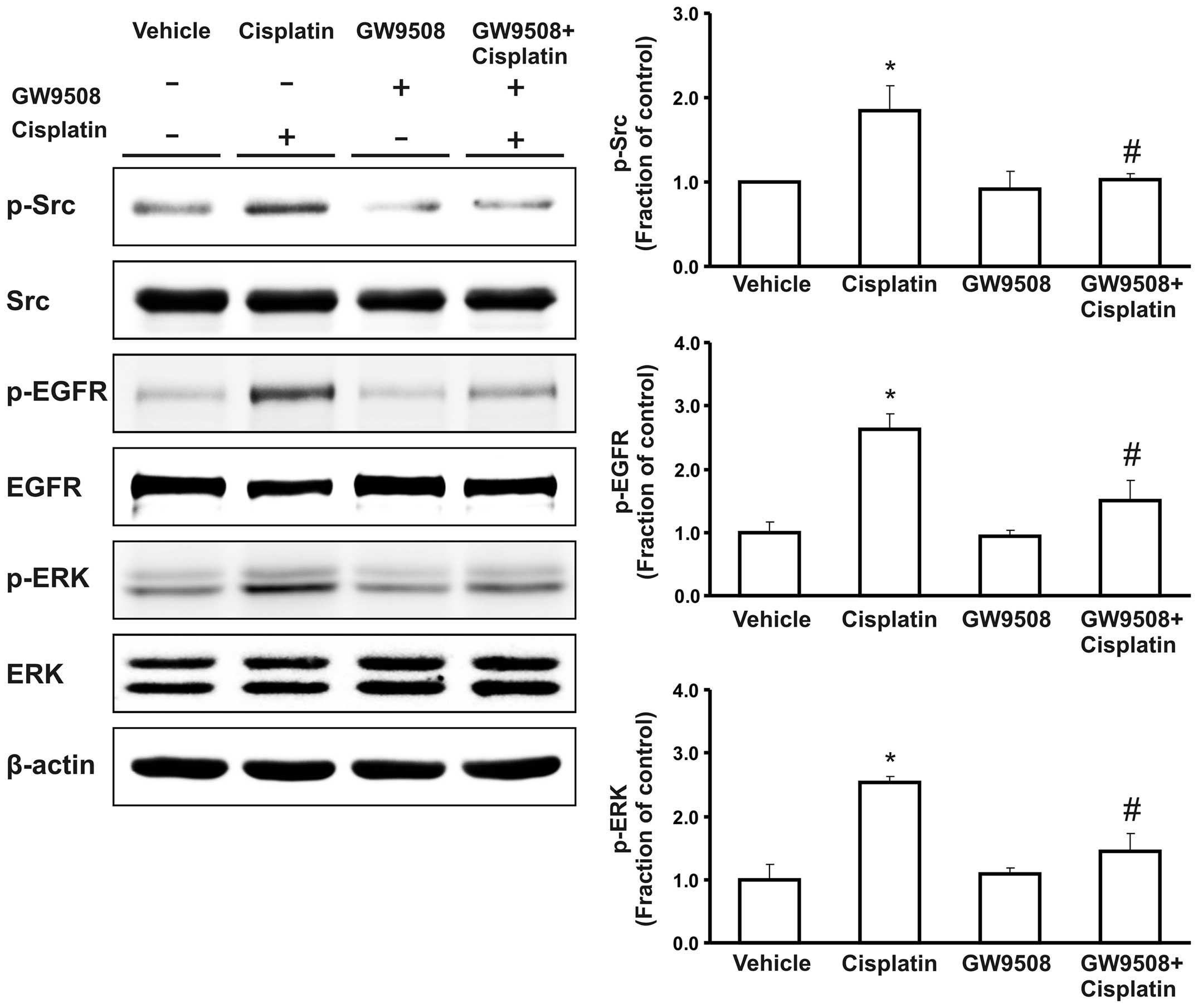|
1
|
Yao X, Panichpisal K, Kurtzman N and
Nugent K: Cisplatin nephrotoxicity: a review. Am J Med Sci.
334:115–124. 2007. View Article : Google Scholar
|
|
2
|
Pabla N and Dong Z: Cisplatin
nephrotoxicity: mechanisms and renoprotective strategies. Kidney
Int. 73:994–1007. 2008. View Article : Google Scholar : PubMed/NCBI
|
|
3
|
Arany I, Megyesi JK, Kaneto H, Price PM
and Safirstein RL: Cisplatin-induced cell death is EGFR/src/ERK
signaling dependent in mouse proximal tubule cells. Am J Physiol
Renal Physiol. 287:F543–F549. 2004. View Article : Google Scholar : PubMed/NCBI
|
|
4
|
Jo SK, Cho WY, Sung SA, Kim HK and Won NH:
MEK inhibitor, U0126, attenuates cisplatin-induced renal injury by
decreasing inflammation and apoptosis. Kidney Int. 67:458–466.
2005. View Article : Google Scholar : PubMed/NCBI
|
|
5
|
Kim YK, Kim HJ, Kwon CH, Kim JH, Woo JS,
Jung JS and Kim JM: Role of ERK activation in cisplatin-induced
apoptosis in OK renal epithelial cells. J Appl Toxicol. 25:374–382.
2005. View
Article : Google Scholar : PubMed/NCBI
|
|
6
|
Mishima K, Baba A, Matsuo M, Itoh Y and
Oishi R: Protective effect of cyclic AMP against cisplatin-induced
nephrotoxicity. Free Radic Biol Med. 40:1564–1577. 2006. View Article : Google Scholar : PubMed/NCBI
|
|
7
|
Li S, Gokden N, Okusa MD, Bhatt R and
Portilla D: Anti-inflammatory effect of fibrate protects from
cisplatin-induced ARF. Am J Physiol Renal Physiol. 289:F469–F480.
2005. View Article : Google Scholar : PubMed/NCBI
|
|
8
|
Lee S, Kim W, Moon SO, et al:
Rosiglitazone ameliorates cisplatin-induced renal injury in mice.
Nephrol Dial Transplant. 21:2096–2105. 2006. View Article : Google Scholar : PubMed/NCBI
|
|
9
|
Sung MJ, Kim DH, Jung YJ, et al: Genistein
protects the kidney from cisplatin-induced injury. Kidney Int.
74:1538–1547. 2008. View Article : Google Scholar : PubMed/NCBI
|
|
10
|
Sum CS, Tikhonova IG, Neumann S, Engel S,
Raaka BM, Costanzi S and Gershengorn MC: Identification of residues
important for agonist recognition and activation in GPR40. J Biol
Chem. 282:29248–29255. 2007. View Article : Google Scholar : PubMed/NCBI
|
|
11
|
Itoh Y, Kawamata Y, Harada M, et al: Free
fatty acids regulate insulin secretion from pancreatic beta cells
through GPR40. Nature. 422:173–176. 2003. View Article : Google Scholar : PubMed/NCBI
|
|
12
|
Bharate SB, Nemmani KV and Vishwakarma RA:
Progress in the discovery and development of small-molecule
modulators of G-protein-coupled receptor 40 (GPR40/FFA1/FFAR1): an
emerging target for type 2 diabetes. Expert Opin Ther Pat.
19:237–264. 2009. View Article : Google Scholar : PubMed/NCBI
|
|
13
|
Gowda N, Dandu A, Singh J, et al:
Treatment with CNX-011-67, a novel GPR40 agonist, delays onset and
progression of diabetes and improves beta cell preservation and
function in male ZDF rats. BMC Pharmacol Toxicol. 14:282013.
View Article : Google Scholar : PubMed/NCBI
|
|
14
|
Wagner R, Kaiser G, Gerst F, et al:
Reevaluation of fatty acid receptor 1 as a drug target for the
stimulation of insulin secretion in humans. Diabetes. 62:2106–2111.
2013. View Article : Google Scholar : PubMed/NCBI
|
|
15
|
Fujita T, Matsuoka T, Honda T, Kabashima
K, Hirata T and Narumiya S: A GPR40 agonist GW9508 suppresses CCL5,
CCL17, and CXCL10 induction in keratinocytes and attenuates
cutaneous immune inflammation. J Invest Dermatol. 131:1660–1667.
2011. View Article : Google Scholar : PubMed/NCBI
|
|
16
|
Wauquier F, Philippe C, Léotoing L, et al:
The free fatty acid receptor G protein-coupled receptor 40 (GPR40)
protects from bone loss through inhibition of osteoclast
differentiation. J Biol Chem. 288:6542–6551. 2013. View Article : Google Scholar : PubMed/NCBI
|
|
17
|
Kim SW, Lee JU, Nah MY, Kang DG, Ahn KY,
Lee HS and Choi KC: Cisplatin decreases the abundance of aquaporin
water channels in rat kidney. J Am Soc Nephrol. 12:875–882.
2001.PubMed/NCBI
|
|
18
|
Ma SK, Choi JS, Joo SY, et al: Activation
of the renal PI3K/Akt/mTOR signaling pathway in a DOCA-salt model
of hypertension. Chonnam Med J. 48:150–154. 2012. View Article : Google Scholar : PubMed/NCBI
|
|
19
|
Rosenau C, Emery D, Kaboord B and
Qoronfleh MW: Development of a high-throughput plate-based
chemiluminescent transcription factor assay. J Biomol Screen.
9:334–342. 2004. View Article : Google Scholar : PubMed/NCBI
|
|
20
|
Bae EH, Lee J, Ma SK, et al: alpha-Lipoic
acid prevents cisplatin-induced acute kidney injury in rats.
Nephrol Dial Transplant. 24:2692–2700. 2009. View Article : Google Scholar : PubMed/NCBI
|
|
21
|
Park JW, Cho JW, Joo SY, et al:
Paricalcitol prevents cisplatin-induced renal injury by suppressing
apoptosis and proliferation. Eur J Pharmacol. 683:301–309. 2012.
View Article : Google Scholar : PubMed/NCBI
|
|
22
|
Briscoe CP, Tadayyon M, Andrews JL, et al:
The orphan G protein-coupled receptor GPR40 is activated by medium
and long chain fatty acids. J Biol Chem. 278:11303–11311. 2003.
View Article : Google Scholar : PubMed/NCBI
|
|
23
|
Lee S, Moon SO, Kim W, et al: Protective
role of L-2-oxothiazolidine-4-carboxylic acid in cisplatin-induced
renal injury. Nephrol Dial Transplant. 21:2085–2095. 2006.
View Article : Google Scholar : PubMed/NCBI
|
|
24
|
Mukhopadhyay P, Horváth B, Zsengellér Z,
et al: Mitochondrial-targeted antioxidants represent a promising
approach for prevention of cisplatin-induced nephropathy. Free
Radic Biol Med. 52:497–506. 2012. View Article : Google Scholar : PubMed/NCBI
|
|
25
|
Chen J, Chen JK, Nagai K, et al: EGFR
signaling promotes TGFβ-dependent renal fibrosis. J Am Soc Nephrol.
23:215–224. 2012.
|
|
26
|
Chen J, Chen JK and Harris RC: Angiotensin
II induces epithelial-to-mesenchymal transition in renal epithelial
cells through reactive oxygen species/Src/caveolin-mediated
activation of an epidermal growth factor receptor-extracellular
signal-regulated kinase signaling pathway. Mol Cell Biol.
32:981–991. 2012. View Article : Google Scholar
|















